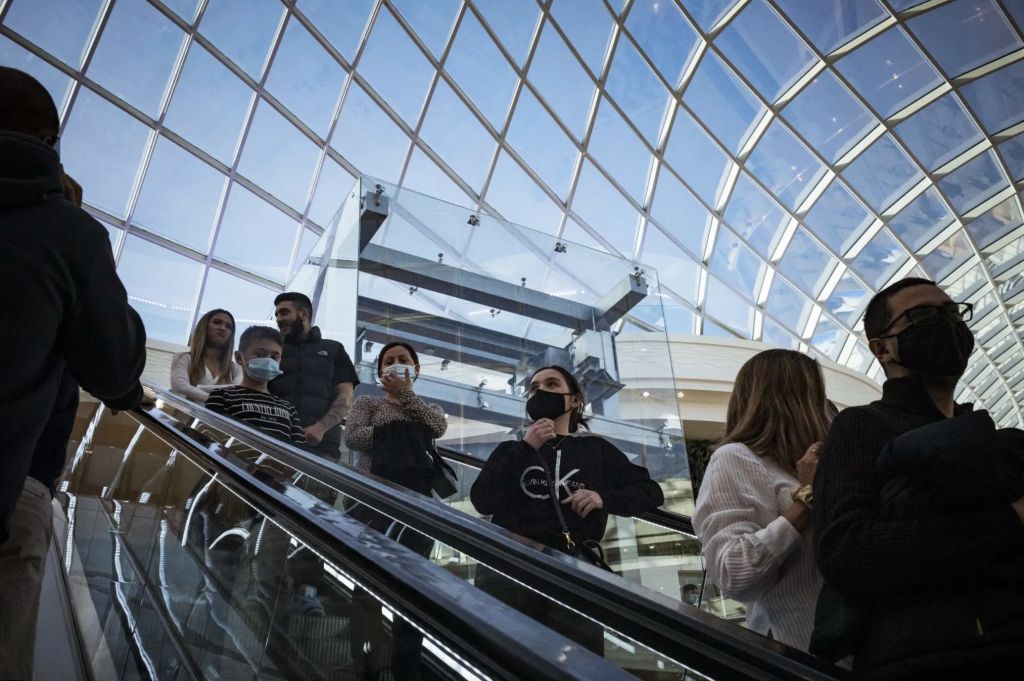Major business groups have rejected advice from state and federal chief health officers to consider allowing employees to work from home, warning that the fledgling economic recovery since the end of harsh lockdowns would be jeopardised.
While no state or territory government is contemplating a reintroduction of mask mandates indoors or work from home orders for now, they are not ruling it out if the winter wave of COVID-19 cases worsens or health advice changes.
Many major workplaces allow a hybrid model with some days in the office and some at home, but health groups such as the Australian Medical Association are urging more restrictive measures such as mask mandates to help avoid hospitals becoming overwhelmed.
Ai Group’s Victorian head Tim Piper said a return to more remote work at this stage – especially if it were mandated – would hinder the progress that many businesses have made since heading back to face-to-face work early this year.
“The suggestion undermines the really good effort that employers and employees have made since Omicron really hit us in January,” he said.
Adopting other COVID safety measures, such as mask-wearing in offices to help reduce transmission, would hurt the momentum that businesses have built since the lockdowns.
“The revisiting of masks in offices would be absolutely counter-productive,” he said. “It’s the one issue that has galvanised people to stay away from work.”
On Friday, the Australian Health Protection Principal Committee (AHPPC), whose members include the chief health officers from the states and territories, warned of a new wave of infections, driven by the BA.4 and BA.5 Omicron subvariants.
It said that was expected to “lead to a substantial increase in infections, hospitalisations and sadly, deaths, at a time when our communities and health systems are already under strain”.
Among measures including increasing vaccination rates, the group advised employers to review their occupational health and safety risks and “consider the feasibility of some employees working from home and support employees to take leave when sick”.
That advice came amid a sharp increase in cases. Victoria recorded 7934 new cases of coronavirus on Sunday, while New South Wales hit new 8670 cases. There are more than 300,000 active cases across the country and hundreds of people are dying with COVID-19 each week.
Governments across the country are wary of reintroducing mandates, insisting the country is in a new phase of the pandemic and the public were fatigued by mandates. On Sunday, federal Health Minister Mark Butler said there was “no advice” to bring mask mandates back over winter.
“We’re beyond … lockdowns and mandates and emergency payments,” he told ABC Insiders.
Last week, NSW Health Minister Brad Hazzard warned against mandates and argued these rules may harm mental wellbeing. On Sunday, acting Victorian Premier Jacinta Allan stressed that Victorians should wear masks in high-risk settings where they remain mandated, such as public transport and hospitals, and stay home if they feel unwell.
Queensland Deputy Premier Steven Miles encouraged people to wear masks indoors but said the government would not mandate it. South Australian police commissioner Grant Stevens, who controls public health directions, said recently that a mask mandate was “up for consideration” depending on hospitalisation rates, but would be a “last resort”.
Victoria is the only state in which legislation requires the government to publish advice from health officials to ministers. In the most recent advice published on June 20, chief health officer Brett Sutton noted decision makers needed to consider “community fatigue with public health measures and the pandemic more broadly”.
Business Council of Australia chief executive Jennifer Westacott said given Australia’s high vaccination rates, work-from-home mandates would be ill-advised and harm the economy.
“With one of the world’s highest vaccination rates, whatever we do, we cannot retreat to Delta or early Omicron settings, which will stifle our recovery and cripple small business,” the head of Australia’s biggest business lobby group said.
A Commonwealth Bank spokesperson said the company’s office staff had returned to work in a “hybrid” capacity since March and the company would continue to monitor the changing situation.
Other major city-based employers including Australia Post and AGL offer flexible work policies that allow staff to spend part of the week at home, and these policies will continue.
Brendan Coates, economic policy program director at the Grattan Institute, said that while it seemed unlikely governments would mandate work-from-home arrangements again, workers may choose to do so if case numbers rose further.
This could shift spending, particularly in hospitality, back out of city centres, he said.
“The impact [of work-from-home orders] has been to shift economic activity from the CBD back towards the suburbs where people live.”
Employers in sectors with large numbers of frontline workers, such as retail, are feeling the pressure of staff shortages due to illness.
“Staff absences due to sick leave from COVID and the flu are adding to the current woes of retailers with labour shortages crippling the economy,” Australian Retailers Association chief executive Paul Zahra said.
Despite this, major grocery retailers Woolworths, Coles and Aldi say they are prepared for any increase in case numbers.
“We’ve seen some absenteeism during the winter flu season which is not unusual … these rates are well below what we saw during the first Omicron wave in January,” a Woolworths spokesperson said.
Professor James McCaw, who advised AHPPC for the first two years of the pandemic, said he did not believe mandates were optimal three years into the pandemic.
“They are not necessarily the most effective way to bring people on board. It’s time for positive messaging to allow people to understand how to keep themselves and their communities safe,” he said.
